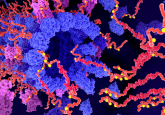Blood-based assay could help to detect gastrointestinal cancers
Researchers have developed a new blood-based assay that utilizes cell-free DNA to identify the methylation signal of gastrointestinal (GI) cancers. The details of the assay are to be presented by the research team at the Gastrointestinal Cancers Symposium, San Francisco, CA, USA, 23–25 January 2020.
The new assay could facilitate the early identification of GI cancers. Limitations of current physical examinations means that small asymptomatic tumors are not easily detected. The blood-based assay also has the potential to address the unmet need for tests that screen for gallbladder, bile duct and pancreatic cancers.
Lead investigator, Brian Wolpin, Director of the Gastrointestinal Cancer Center and Director of the Hale Family Center for Pancreatic Cancer Research at Dana-Farber Cancer Institute (MA, USA) explained:
“The potential of this test is to diagnose cancer earlier, when it’s more treatable. The ability to do that across cancer types could be quite valuable. Many of the cancer types that this test detects don’t currently have screening tests that allow earlier cancer detection before the cancers cause symptoms.”
The new blood-based assay utilizes bisulfite sequencing to identify patterns of methylation in cell-free DNA. Cell-free DNA is degraded DNA fragments found circulating in the bloodstream and can come from a number of sources, including tumor cells.
The Circulating Cell-Free Genome Atlas study presented at the Gastrointestinal Cancers Symposium enrolled patients covering more than 20 diagnosed malignancies at all stages, as well as individuals without cancer. The team also completed a second substudy, which used cross-validated targeted methylation sequencing assays on plasma DNA. The results of the substudy were used to develop an algorithm to detect the presence of GI cancer and identify its location and tissue of origin.
The findings of the study demonstrate that the assay had an overall sensitivity for cancer detection of 82% and 81% in the training and validation sets respectively. The team also report a specificity of greater than 99%, with 91% and 89% accuracy for defining the GI tissue of origin for the training and validation sets respectively.
Wolpin commented: “The data show that evaluating methylation of cell-free DNA within a blood sample, may detect a variety of gastrointestinal cancers with good sensitivity and with a low rate of false positives. If further validated with additional testing, this approach has the potential to allow us to diagnose gastrointestinal cancers earlier.”
Researchers have begun the next steps to further validate the screening potential of the test and two large population-based studies are currently being conducted. The STRIVE study has approximately 100,000 women undergoing screening mammograms enrolled and the SUMMIT study is enrolling 50,000 individuals without a known cancer diagnosis.
Sources: Abstract: Wolpin BM, Richards DA, Cohn AL et al. Performance of a blood-based test for the detection of multiple cancer types. Presented at the Gastrointestinal Cancers Symposium, San Francisco, CA, USA, 23–25 January 2020; News release: www.asco.org/about-asco/press-center/news-releases/blood-based-test-could-help-identify-hard-detect






